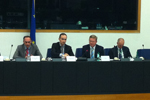Press points by Commissioner Štefan Füle on the Spring Reports on the former Yugoslav Republic of Macedonia, Serbia, and Kosovo*

Following the December General Affairs Council, the presentation of four documents was foreseen for today: a Commission report on the former Yugoslav Republic of Macedonia, two joint reports of the High Representative and the Commission on Serbia and Kosovo, as well as a proposal from the Commission to the Council on authorising the opening of negotiations on a Stabilisation and Association Agreement with Kosovo.
Only one of these four documents was adopted today: the report on the former Yugoslav Republic of Macedonia.
The documents concerning Serbia and Kosovo were discussed but not yet adopted today, since a further meeting of the European Union-facilitated dialogue has just been announced by the High Representative for tomorrow, Wednesday. We are confident that this dialogue on Prime Ministers' level will result in a clear agreement.
This is in the strategic interests of both Serbia and Kosovo, and of the entire Western Balkans region, as well as of the European Union as a whole. It is time for Serbia and Kosovo to move on from the past and look ahead to a common European future. We hope the two leaderships will seize the historical opportunity that lies before them – in the very interest of their citizens. The Commission will then revert to the issue and ensure that a positive outcome of the dialogue is reflected in the final version of both reports, which will be rapidly adopted.
Now on the former Yugoslav Republic of Macedonia. As requested by Council, the report on the former Yugoslav Republic of Macedonia provides information on the "implementation" of EU-related reforms (under the High Level Accession Dialogue) and on "steps taken" in terms of good neighbourly relations and on the 'name issue';
The main conclusion of the Report is that implementation of reforms is on-going and largely back on track after the political crisis of January-February. Relations with neighbours remained good and steps have been taken on the bilateral relations with Bulgaria and Greece. Formal talks on the 'name issue' under the UN auspices took on new momentum during the reporting period. The UN Secretary General's Special Representative tabled another proposal last week in talks in New York with the two negotiators and hope that this can lead to agreement.
In more detail the report shows that the political crisis which followed the events of 24 December 2012 and the solution we found through the agreement reached by the political parties on 1 March 2013, did not prevent progress being made on the implementation of EU reforms. But I made clear to interlocutors in Skopje last week the importance of ensuring the implementation of that agreement, in particular in relations to the Committee of Inquiry and the cross-party Memorandum of Understanding and resumption of dialogue with the journalists.
As regards the questions on which Council asked us to provide extra information, in addition to last autumn's Progress Report, I am pleased that implementation of the EU-related reforms agreed in the High Level Accession Dialogue continued, with progress on almost all of the targets and indicators. I confirmed this myself during a visit to Skopje last Tuesday.
We have, since 2009, delivered four Progress reports recommending opening of accession negotiations. We are now delivering an extra one (at Council's request) with more detail on the two issues. The Commission therefore hopes that the Council, in June, will act upon the Commission recommendations which are on its table.''
More information: Commissioner's speech in AFET.






